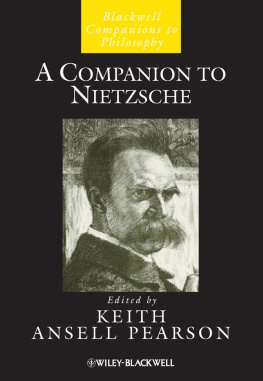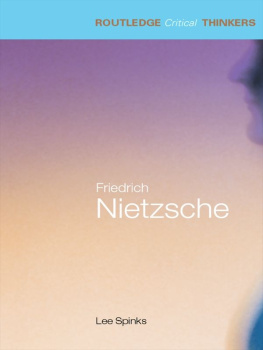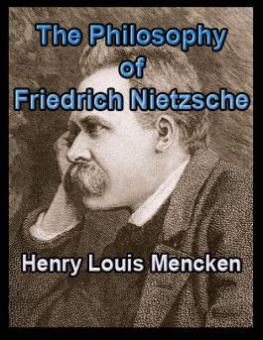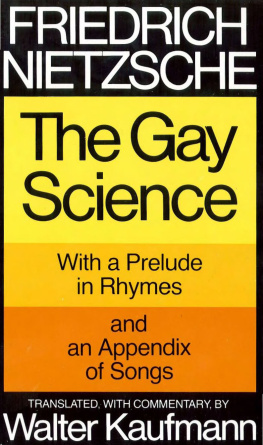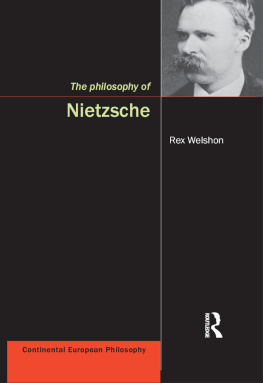Abbreviations of Nietzsches Works
A | The Antichrist |
AOM | Assorted Opinions and Maxims |
BGE | Beyond Good and Evil |
BT | Birth of Tragedy |
CW | The Case of Wagner |
D | Dawn of Day |
EH | Ecce Homo |
GM | On the Genealogy of Morality |
GS | Gay Science |
HH | Human, All Too Human |
KGB | Kritische Studienausgabe Briefe |
KSA | Kritische Studienausgabe |
NCW | Nietzsche Contra Wagner |
PTA | Philosophy in the Tragic Age of the Greeks |
RWB | Richard Wagner in Bayreuth |
SE | Schopenhauer as Educator |
TI | Twilight of the Idols |
UD | On the Use and Disadvantages of History for Life |
WP | The Will to Power |
WS | The Wanderer and His Shadow |
Z | Thus Spoke Zarathustra |
Acknowledgments
I am grateful to Robert Looker and the Looker Foundation for two major grants that enabled me first to begin and then to complete my work on this book.
David Frisby and George Dunn read and commented on my manuscript as it was being written; their contributions have improved my book immensely and I am grateful.
Nietzsches Future
When he sent a copy of Beyond Good and Evil to his high-minded and earnest old friend Malwida von Meysenbug, Nietzsche asked her not to read it and even less to express to him her feelings about it: Lets assume that people may be able to read it around the year 2000. Only the turn of a new millennium would make Nietzsches book approachable, for the greatest events and thoughts ... are comprehended last .... How many centuries does a mind require to be comprehended?that too is a measuring rod, with that too we can create the required order of rank and etiquette (285). Beyond Good and Evil, A Prelude to a Philosophy of the Future is timely, written for the near future, the twentieth and twenty-first centuries, a time of nihilism consequent on the death of God. It points its reader to Thus Spoke Zarathustra, a book that is untimely, written to help create the far future beyond that nihilism, a human future of experiment and celebration that it is necessary to prepare with the greatest care because the future of humanity is a game in which no hand, not even a finger of God plays a part (203).
It belongs to the nature of philosophy itself that the philosopher Nietzsche came into the world unapproachably masked: Around every profound mind a mask is continually growing, thanks to the constantly false, that is, shallow interpretation of every word, every step, every sign of life he gives (40). Knowing the inevitability of masks, Nietzsche chose to weave his own, the mask of a rash truth teller whose unguarded speech would make him seem an immoralist, a devil, the mask of a super-Machiavelli. That mask, and the vehemence with which its terrible contours would be traced by those who took it to be more than a mask, inevitably assigned a task to his friends, advocates bound by the beauty and rigor of his writings to see eventually that the mask masked its opposite, a new teaching on good and bad by something approaching a god.
Nietzsches future still lies in our future, I believe, the possible future of a global species hardened in the truth by science and more fundamentally by the philosophy that grounds science, spurring it to the adventure of experiment, steadying it by a rational measure in accord with the way of all beings, housing it within a spirit of gratitude and celebration.
For Nietzsches philosophy is a love story. He hid that fact because there are acts of love of such a delicacy that nothing is more advisable than to take a stick to any eyewitnessthatll muddle his memory (40). While it wants no eyewitness, such love still wants to be known, to be guessed at, to be felt, ultimately to be duplicated by lovers with a similar temper. So it tells the tale of its love in a masking way befitting the nobility of both lover and beloved. For in loving its beloved it loves as well those with whom it may share the lovers tale, those in whom it can kindle love. Nietzsches philosophy is a love story for lovers.
Other philosophers chose other masks for philosophys tale of love. Platos Socrates argued that philosophy is Eros while constrained to mask Eros to conform to the moral faith in opposite values. Spinoza argued that philosophy is the intellectual love of god while describing both love and god without the surge and throb of the blood in them (GS 372). Leo Strauss expressed the matter in a way that includes all genuine philosophers: philosophy is necessarily accompanied, sustained and elevated by eros. It is graced by natures grace.
Nietzsches tale of the lover is told most fully in Thus Spoke Zarathustra, the tale of a lover so ardent, so vehement that hes blind at first to the true identity of his beloved. Thinking she must be wisdom, he learns the truth with difficulty that his true beloved is life herself. Their love story leads to embrace, for the lover wins his beloved by saying to life: You, you are what I want, exactly as you are, an infinite number of times. Their love story ends in marriage and in children, offspring of a teacher who wants life itself to be eternity.
Nietzsches tale of the lover is told more indirectly in Beyond Good and Evil, tempered for minds of an objective, skeptical, critical bent, minds that can nevertheless be drawn to loves excess not despite the qualities of their minds but because of them.
. Natural Right and History 40.
Nietzsches task in Beyond Good and Evil is philosophys essential political task: in the midst of the most profound natural tendency to hate the natural world morally and live a moral fiction of it, Nietzsches task is to train in philosophys most profound passion, love of truth that matures into love of the world.
1
On the Prejudices of Philosophers
Nietzsches Prelude to a Philosophy of the Future opens with an assault on philosophy. So prominent as a first impression and so effective in the suspicions it arouses or confirms about philosophy, this first chapter of Nietzsches book may seem to destroy permanently the possibility of philosophy as a way to truth. But even though philosophy is always prejudiced for Nietzschealways situated or from a perspective, always interested or driven by passionthat condition need not be fatal to philosophys task of winning the truth. Subsequent chapters, as well as quieter suggestions within the assault itself, gradually recover philosophys original greatness and stake a renewed claim to its capacity to win the truth and even, on that basis, to be the legitimate creator of values and the lawgiver to the sciences. If the opening questions question the value of the will to truth and pose the problem of the value of truth itself, the supreme value of that subjective passion and its elusive object are eventually confirmed by such questioning: Nietzsches book does not end where it begins; it is structured; it opens, advances, and closesand not just once, though its first opening and its final closing clearly have a priority that befit their prominence. The opening questions about truth point the way into a profound and liberating skepticism about philosophythe way to the free mindand then to a way out of that skepticism that does not surrender the intellectual conscience. ).










